New Delhi:Finance Minister Nirmala Sitharaman is going to present Votes on Account on the first of the next month, seeking Parliament’s authorisation for incurring the Government of India's expenditure for the next few months as Prime Minister Narendra Modi’s government will not present a full budget in the election year.
Article 112 of the Constitution requires the government to present estimates for the next year’s revenue receipts and expenditure in the form of Annual Financial Statement (AFS), the exercise is popularly referred to as presentation of the Union Budget. Sub-Clause 1(B) of Article 112 requires the Government to inform the Parliament about the money required to meet other expenditures proposed to be made from the Consolidated Fund of India.
It is a constitutional requirement under the same sub-clause that the Government shall distinguish expenditure on revenue account from other expenditures.
- What is Revenue Expenditure in the Union Budget?
Expenditures incurred by the government are broadly divided into two categories – Revenue Expenditure and Capital Expenditure. In the Union Budget, Revenue Expenditure is the biggest component and it consumes the lion's share of the Union government's expenditure.
For example, in the current financial year, the Union government’s total expenditure, as per the budget estimates, has been pegged at over Rs 45 lakh crore. The data shows that more than three-fourth of it, nearly 78 per cent of this staggering amount has been classified as Revenue Expenditure as required by Article 112 (1) (b) of the Constitution.
In absolute numbers, the Union government would spend over Rs 35 lakh crore of the total Union Budget of Rs 45 lakh crore on revenue expenditure this year.
- Revenue Expenditure does not lead to asset creation
